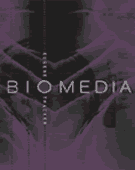We've seen how advancements in genetic sciences have combined to result in genetically modified (GM) plants, animals, and now cloned humans. Artists have also engaged these developments, producing works that both celebrate and criticize the deployment of biotechnologies. The powerful information processing capabilities of silicon-based computing has enabled the sequencing and analysis of our genetic code, and that of many other organisms, but for the most part, the two components - biological DNA and information processing - have been considered independent. Well, according to Georgia Tech's Eugene Thacker in his new book Biomedia, that's all changing. The concept of 'biomedia' breaks down the traditional barriers between the biological body and technological machines. Not to be misunderstood as a furthering of the notion of the cyborg, 'biomedia' refers to emerging fields of research and development, like 'computational biology' in which information processing is achieved through biological means. BioPerl, a bioinformatics project based on the Perl programming language, is one example of such developments that leads Thacker to ask questions like 'What if 'life' turned out to be a form of computation?" - Ryan Griffis
